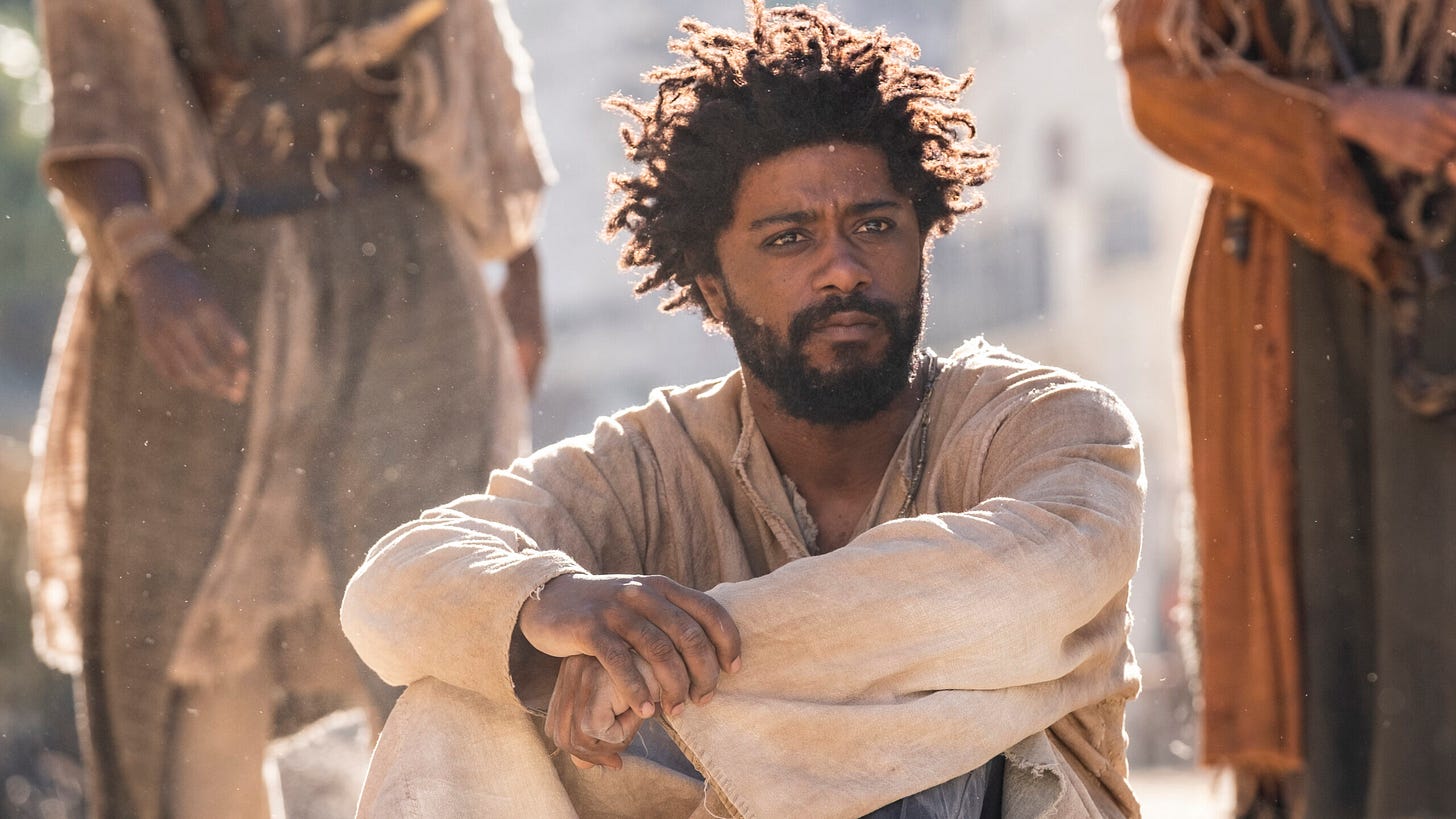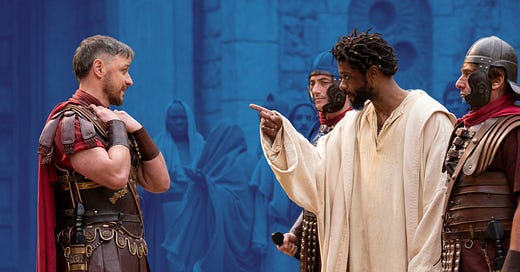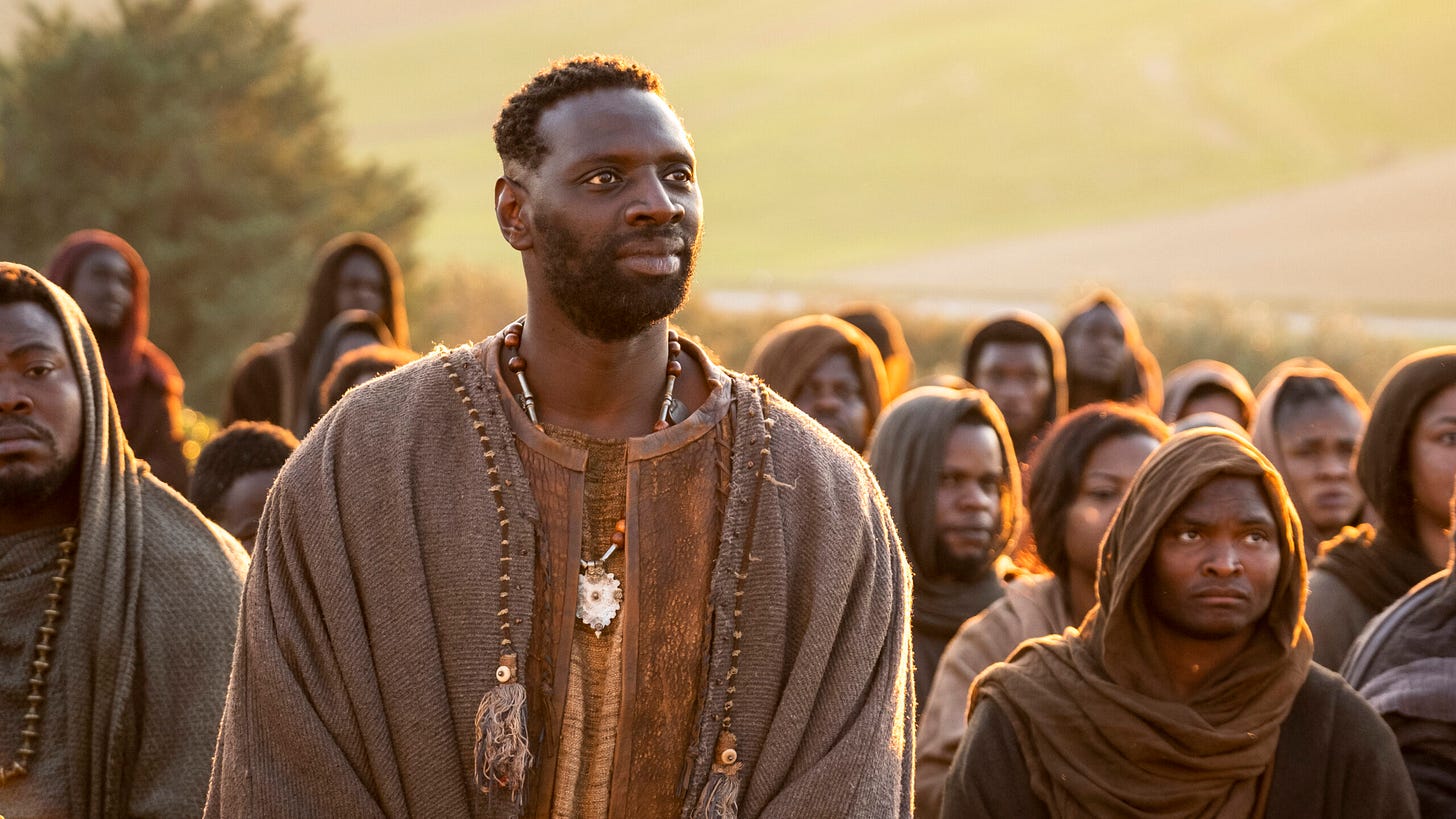
If there’s one film I’ve had my eye on for months, it’s The Book of Clarence. I loved Jeymes Samuel’s feature film debut, The Harder They Fall, and was eager to see his sophomore effort. But even more so, I was drawn in by the description of his newest film:
THE BOOK OF CLARENCE is a bold new take on the timeless Biblical-era epic. Streetwise but down-on-his-luck, Clarence (LaKeith Stanfield) is struggling to find a better life for his family, while fighting to free himself of debt. Captivated by the power and glory of the rising messiah and His apostles, he risks everything to carve his own path to a divine life, and ultimately discovers that the redemptive power of belief may be his only way out.
As a filmmaker and film lover, I was excited. But as a Christian, the trailers for the film left me ambivalent. Would this be a mockery of my faith? Would it be affirmative? Or, at the very least, respectful? It’s never my role or intent to gatekeep film, but I didn’t want to rush out to watch something that made light of my identity in Christ.
Looking online for a consensus to guide me was a fruitless endeavor. Several Christian reviews mentioned the film’s blasphemy, individuals walking out of the theater in disgust, or simply being embarrassed to have seen it. Meanwhile, atheists on Reddit and other forums were complaining about the film trying to “convert” them, feeling tricked into watching an overtly Christian film.
This dichotomy of opinions settled it for me; I had to see what all the fuss was about. What could have possibly managed to upset believers and non-believers alike? Keep reading as I unpack that and more (with heavy spoilers for the film).
Why Do People Think It’s Heresy?
Short answer, it’s not heresy. But I get why it makes some believers uncomfortable. Whether it’s Titanic, Big Eyes, or Oppenheimer, viewers should always expect some embellishments or deviations from real life when watching biographical films. After all, “based on a true story” leaves a lot of leeway. Which parts are true? Which parts are purely for narrative stakes? It’s a component of any biopic or historical film that we’ve just come to accept as audiences.
However, that’s a much harder pill to swallow when it comes to biblical adaptations. After all, these aren’t just a set of true events. They’re events that led to Christians’ core beliefs, our identity in Christ, our way of living. So where most people can readily forgive James Cameron for making up a love story at the center of Titanic’s tragedy (a film full of interactions with real life crew and passengers), it’s not so easy to accept a new story set during Jesus’ ministry, full of fictional interactions with the apostles, Romans like Pontius Pilate, and even Jesus himself.

The fact that Jeymes Samuel’s film is so stylistically deviant from other biblical films adds yet another layer to the discomfort that Christians may feel when watching. In both The Harder They Fall and The Book of Clarence, Samuel channels a unique mixture of Quentin Tarantino and Spike Lee to create an atmosphere unlike most westerns or biblical epics. Tarantino’s flares are present in the flashy visuals and editing style, and most of all, the music. After all, how many biblical films have you seen featuring hip hop and soul music? Spike Lee’s influence can clearly be seen in the social and racial commentary (all Romans in the film are white, while all the Jews are Black), and the intentional blend of naturalistic and stilted dialogue.
All of this results in a period film unlike most others. Jesus recites some scripture verbatim, but just as frequently speaks in modern vernacular. Clarence fights in gladiator matches but then dances to Kid Cudi. Even the camera frequently alternates between clashing styles, some scenes featuring the wide, long takes associated with classic Hollywood, and others featuring modern techniques like whip zooms and whip pans. It’s a lot to digest, particularly for Christian audiences that may have been expecting a more traditional approach to both the subject matter and the filmmaking style.
Why Do People Think It’s Too Christian?
Short answer: the film sides with Christ and Christianity. And honestly? That surprised me as much as anyone else. We’re not talking about a faith-based studio production; this was produced by Legendary Pictures (The Dark Knight, Jurassic World, Dune), though it’s distributer TriStar Pictures does at least have a history of releasing faith-based films.
So after the marketing materials focused on the farcical aspects of the film, and nearly everyone associated with the film didn’t have a history of Christian productions, I went in expecting Christ’s depiction to be ambiguous at best (maybe he’s the son of God, maybe he isn’t) and insulting at worst (yep, he’s faking miracles just like Clarence).
As it turns out, the film is not only largely respectful of the figure of Jesus, but ultimately recognizes his divinity, unequivocally showing us by the end that Jesus is the Messiah. When Clarence first sets out to figure out how Jesus does his “tricks,” every person he encounters tells him Jesus is the real deal. The disciples are emphatic about his power; Mother Mary shares with him the story of Jesus’ miraculous birth. Even the Romans realize that Jesus is different from other Jewish “threats,” with James McAvoy’s Pilate hilariously displeased at Christ’s teaching that all men are equal.

It’s in the film’s third act, however, that we move from not just a respectful portrayal of Jesus to a clear representation of his true identity. Clarence’s friend Elijah witnesses Jesus save the woman caught in adultery (from John 8). Clarence is saved from drowning by heavenly intervention. And in the film’s final scene, Clarence dies and is brought back to life by Jesus, with Jesus saying to Clarence the same words he spoke in the story of Lazarus, “I am the resurrection and the life. The one who believes in me will live, even though they die.”
It’s no wonder non-Christian audiences were caught off guard! A film that by all means appeared to be a satirical comedy doesn’t mock Jesus’ life and lordship, but embraces it.
What If “Doubting Thomas” Had a Brother?
So now I’ve covered why the film has been jarring for Christians and non-Christians alike, but what was the film actually trying to say? What was going on with all these conflicting viewpoints?
Jeymes Samuel is far from subtle with his message of belief and true enlightenment, but those unfamiliar with the Bible may not realize just how deep those messages go. And that starts with one very simple, but important decision by the filmmakers: Clarence is the twin brother of the apostle Thomas.
For those that may not know, Thomas is often referred to as “Doubting Thomas,” telling his fellow apostles after the resurrection that “Unless I see the nail marks in [Jesus’] hands and put my finger where the nails were, and put my hand into his side, I will not believe.” A week later, Jesus appears to Thomas, saying, “Put your finger here; see my hands. Reach out your hand and put it into my side. Stop doubting and believe.” Thomas wouldn’t fully believe until he’d seen.
But here’s the thing: Thomas at least had enough faith to already be a disciple of Jesus. If Thomas was a doubter but still a believer, how skeptical and dismissive would someone have to be to not follow Christ at all? Armed with this question, the film gives us Clarence, his unbelieving brother. Clarence exhibits many of the same qualities we see from Thomas in scripture, constantly asking for facts, evidence, and knowledge, dismissing others for their unfounded belief. Even once Clarence decides to start “preaching” to gain followers, his sermons all center around the need for knowledge, telling crowds that “knowledge is stronger than belief.”
Clarence is given so many opportunities in the film for belief. As previously mentioned, everyone around him is constantly telling him that Jesus really is the son of God, from the disciples to Mary to Clarence’s own friends. Even Barnabas (yes, that Barnabas, another biblical Easter egg) tells Clarence that there’s something different and special about Jesus. And living up to his brother’s doubting trait, Clarence just won’t believe.

But that all changes when Clarence encounters God for himself. Eventually captured by the Romans for claiming to be a messiah, Clarence (who cannot swim) is forced into a deep pool, mockingly told to walk on the water. Fearing for his life, Clarence slowly steps into the pool, only for the heavens to open and God to protect him, letting him walk cross the water. And with this, Clarence finally believes.
When Thomas comes to visit his brother in prison, Clarence is a changed man. Though Biblically speaking we might not consider his newfound faith to be born of the best causes (after all, “blessed are those who have not seen and yet have believed”), Clarence’s conversion is perfectly in line with his character. When Thomas asks if he believes now, Clarence responds, “I don’t believe, I know.” Clarence has sought knowledge his entire life, and his miraculous encounter with God has finally given him that knowledge – Jesus is the real Messiah.
Of course, having walked on water (and later refusing to give up Jesus’ location), the Romans sentence Clarence to the same fate that many in that time faced: crucifixion. It was at this point in the story (and even more so in Clarence’s resurrection through Christ), that I was reminded of another teaching of Jesus, “Whoever wants to be my disciple must deny themselves and take up their cross and follow me. For…whoever loses their life for me and for the gospel will save it.” At an earlier point in the film, Clarence was trying to become a disciple of Jesus. And even though his faith journey in this verse is carried out much more literally than most of ours, the application is perfect. If Clarence truly wants to be Jesus’ disciple, he has to take up his cross and lose his life for Christ.
And that’s what he does; he’s hung on a cross to die surrounded by a dozen or so other perceived threats to the Roman Empire. In parallel to the story of the two thieves on the cross, one angry man on the cross yells at the crowd, asking God to punish them all. But on the cross beside him, Clarence has finally realized what life is really about, telling Benjamin “People don't need punishment. People need enlightenment.”
A Lightbulb Moment
So what is The Book of Clarence? It’s a film that has upset some Christians and some non-Christians. It’s a film with an admittedly tonally uneven third act that has frustrated even the film’s supporters. It’s a film that Wikipedia has hilariously (but appropriately) labeled as a “biblical comedy-drama.” Is it biblical? Is it a comedy? Is it a drama? Yep.
That’s not to mention there’s so much to the film that I haven’t even had a chance to explore here. For example, Clarence repeatedly says to himself, “I’m not a nobody.” He has an identity crisis, he wants to be something more, and the way he finally does that is by realizing his true identity is in Christ. Or another example, Clarence’s shift from being self-centered to putting others’ needs before his own, using his money to free slaves rather than pay his own debts.
But ultimately, The Book of Clarence is a remarkable meditation on belief and identity, Clarence’s life transformed by belief and realizing where his true identity lies.
One recurring visual motif in the film is that of an animated lightbulb appearing above Clarence’s head. The lightbulb always represents a moment of “enlightenment” for him, usually signaling that he’s come up with yet another scheme for success or safety. But as the film ends and Jesus brings him back to life, the camera closes in on Clarence, one final lightbulb appearing over his head. The light of the world has given Clarence the light of life. And as unconventional as the film may be, that was a message I was thrilled to see in theaters.
I pray that the eyes of your heart may be enlightened in order that you may know the hope to which he has called you, the riches of his glorious inheritance in his holy people, and his incomparably great power for us who believe.




